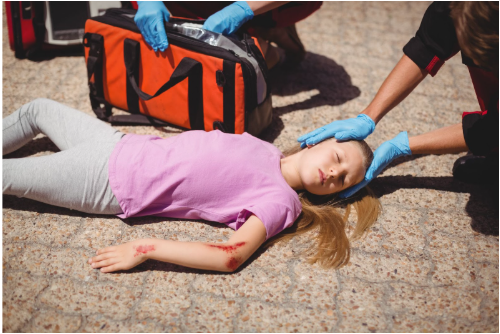When a child is injured due to someone else’s carelessness, the emotional toll on families can be overwhelming. Parents want answers, justice, and support, but they also need to understand how the law works. In South Carolina, personal injury claims involving children or minors follow special rules designed to protect the child’s long-term interests.
Knowing how South Carolina law handles personal injury claims involving children or minors can help families take the right steps toward recovery and compensation.

Who Can File a Personal Injury Claim for a Minor?
Children under 18 cannot file lawsuits on their own. In South Carolina, a parent or legal guardian must file the personal injury claim on the child’s behalf. This person is known as the “next friend” or “guardian ad litem” and is responsible for making legal decisions throughout the case.
The claim can seek compensation for medical bills, pain and suffering, and other damages. If the child has long-term injuries, the claim may also include future medical costs and loss of earning potential.
Personal injury cases involving minors are more complicated than adult claims. They require careful planning, court oversight, and a deep understanding of how injuries may affect a child’s development. That’s why families often turn to the South Carolina personal injury attorneys such as at Stewart Law Offices for guidance. With the help of legal guidance, families can deal with the legal system with confidence and focus on helping their child heal.
How Are Settlements Handled for Minors?
South Carolina law requires court approval for any settlement involving a minor, ensuring the agreement is fair and protects the child’s long-term interests. Under South Carolina Code § 62-5-433, settlements exceeding $25,000 must undergo formal judicial review, while smaller amounts may be approved through a streamlined process. In many cases, the funds are placed in a structured settlement or trust account. This prevents misuse and ensures the money is available when the child needs it—often when they turn 18.
If a child’s parents or legal guardians are unavailable or if there’s a conflict of interest, the court may appoint a guardian ad litem. This person represents the child’s best interests and helps manage the claim and any resulting funds.
The guardian ad litem may also be involved in reviewing the settlement and making recommendations to the court.

What If the Injury Happened on Someone Else’s Property?
If a child is injured on another person’s property—like a playground, swimming pool, or construction site—the property owner may be held responsible. South Carolina law includes the attractive nuisance doctrine, which means property owners must take extra precautions if something on their property could attract children and pose a danger.
Examples include:
- Unfenced pools
- Abandoned vehicles
- Dangerous machinery
- Unsecured trampolines
According to Brent P. Stewart, an attorney from Stewart Law Offices, “property owners have a legal and moral duty to secure hazards that may attract children, even if those children aren’t invited. The law recognizes that curiosity doesn’t negate responsibility.”
In most South Carolina personal injury cases, the statute of limitations is three years from the date of the injury. However, when the injured person is a minor, the deadline is extended. The child has three years from their 18th birthday to file a claim.
What Types of Damages Are Available in Minor Injury Cases
Here are the types of damages available in minor injury cases:
Economic Damages for Children
When children are injured, they may be entitled to compensation for various economic damages, including current and future medical expenses, costs of rehabilitation and therapy, special education needs if the injury affects learning, and lost future earning capacity if the injuries will impact their ability to work as adults.
Calculating future damages for children can be particularly complex because it requires projecting their needs and earning potential over many decades. This often involves working with medical professionals, economists, and life care planners to develop accurate projections of the child’s future needs and costs.
Non-Economic Damages
Children are also entitled to compensation for non-economic damages such as pain and suffering, emotional distress, loss of enjoyment of childhood activities, and permanent disability or disfigurement. These damages can be substantial in cases involving children because they may impact the child for their entire lifetime.
Courts and juries often award significant non-economic damages in cases involving injured children because they recognize the profound impact that serious injuries can have on a child’s development, social relationships, and overall quality of life.
Parents’ Associated Claims
When a child is seriously injured, parents may have their claims for damages, including medical expenses they incurred for their child’s treatment, lost wages from time missed at work to care for their injured child, loss of services the child would have provided (such as household chores), and loss of companionship and society.
These parental claims are separate from the child’s claims and are subject to different legal standards and time limits. Understanding and pursuing both sets of claims is important for obtaining complete compensation for the family’s losses.
What Role Do Insurance Companies Play?
Insurance companies often handle the financial side of personal injury claims. They may offer a settlement to cover medical bills and other damages. But when a child is involved, negotiations can be more complicated.
Insurance adjusters may try to minimize payouts or argue that the injury wasn’t serious. That’s why having legal representation is important. Attorneys can push back, present evidence, and ensure the settlement reflects the child’s true needs.
Conclusion
An injury to a child is one of the most difficult things a family can go through. The law in South Carolina understands this, and it has put special protections in place to safeguard an injured child’s rights and their future. From the special time limits to the court-supervised settlements, every step of the process is designed with the child’s best interest at heart.